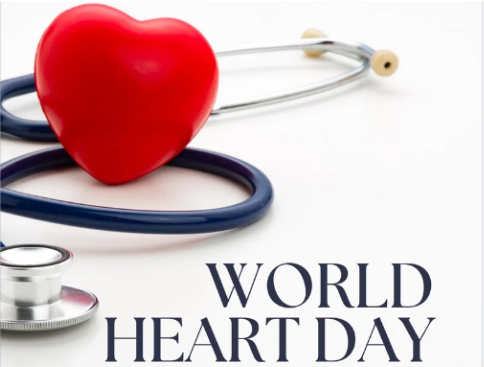World Heart Day, observed on September 29th each year, is a global initiative that resonates deeply in India, a country with a growing burden of cardiovascular diseases (CVDs). This day serves as a powerful reminder to prioritize heart health, raise awareness, and inspire positive lifestyle changes. In this article, we will explore the significance of World Heart Day, shedding light on the prevalent heart-related challenges, preventive measures, and the collective efforts to ensure healthier hearts across the nation.
The Heart of the Matter: Understanding Cardiovascular Diseases (CVDs)
Cardiovascular diseases encompass a range of conditions affecting the heart and blood vessels. These include heart attacks, strokes, heart failure, and various other heart-related ailments. CVDs are the leading cause of mortality globally, and India is no exception.
The Burden in India:
India faces a considerable burden of cardiovascular diseases, with an increasing number of individuals succumbing to heart-related ailments. Factors such as sedentary lifestyles, poor dietary habits, and genetic predispositions contribute to this rising tide of heart health issues.
Lifestyle Impact:
In India, lifestyle choices play a significant role in the prevalence of heart diseases. The rapid urbanization and changes in dietary patterns, often characterized by high consumption of unhealthy fats, sugars, and processed foods, contribute to the risk factors for heart ailments.
Rise of Non-Communicable Diseases (NCDs):
Non-communicable diseases, including cardiovascular diseases, have emerged as major health concerns in India. These diseases are often linked to lifestyle choices, making prevention and awareness crucial components of public health initiatives.
World Heart Day in India: A Call to Action
World Heart Day acts as a catalyst for awareness campaigns across India. Various health organizations, NGOs, and healthcare professionals come together to spread awareness about heart health through community events, health camps, and educational programs.
Public Engagement: The day encourages active participation from the public. Campaigns leverage digital platforms, traditional media, and community outreach to engage individuals in understanding the importance of heart health and adopting heart-friendly lifestyles.
The Role of Healthcare Media: Spreading the Heart Health Message Through Medicircle
Healthcare media, including platforms like Medicircle, plays a crucial role in disseminating accurate information about heart health. Through articles, videos, and interactive content, platforms like ours contribute to the awareness drive, helping people make informed decisions about their health.
Expert Insights: Healthcare media platforms often collaborate with leading cardiologists and healthcare professionals to provide expert insights. This not only educates the public but also empowers them to take proactive steps toward better heart health.
Dietary Choices: India's diverse culinary landscape offers an array of heart-healthy foods. Embracing a diet rich in fruits, vegetables, whole grains, and lean proteins can significantly contribute to heart health.
Physical Activity: A sedentary lifestyle is a significant risk factor for heart diseases. Regular physical activity, even in the form of daily walks, promotes cardiovascular fitness and overall well-being.
Stress Management: Stress is often an overlooked contributor to heart diseases. Techniques such as meditation, yoga, and mindfulness can play a vital role in stress management and heart health.
Initiatives Across India: States and regions across India actively participate in World Heart Day initiatives. From awareness rallies in urban centers to health camps in rural areas, the efforts are diverse and widespread.
Corporate Involvement:
Corporate organizations recognize the impact of employee well-being on productivity. Many companies organize health check-ups, fitness programs, and awareness sessions on World Heart Day to promote a healthy work environment.
Challenges and Solutions: Navigating the Heart Health Landscape
Challenges: Challenges in promoting heart health in India include a lack of awareness in rural areas, limited access to healthcare facilities, and economic barriers that hinder individuals from adopting heart-healthy practices.
Solutions: Government-led healthcare programs, partnerships with private healthcare providers, and community-driven initiatives are essential components in overcoming these challenges. Ensuring accessibility to affordable healthcare services remains a key focus.
Policy Initiatives: Government initiatives, such as the National Programme for Prevention and Control of Cancer, Diabetes, Cardiovascular Diseases, and Stroke (NPCDCS), aim to address the growing burden of NCDs, including cardiovascular diseases.
Technological Advancements: Technological advancements in healthcare, including telemedicine and digital health platforms, contribute to improved accessibility to healthcare services, including preventive measures for heart health.
World Heart Day in India is not just a day; it's a symphony, a harmonious heartbeat echoing the collective commitment to better heart health. As the nation strives to overcome the challenges posed by cardiovascular diseases, the significance of this day grows. Through awareness, education, and proactive initiatives, India is on the path to a healthier heart landscape, ensuring that every beat resonates with the melody of a thriving, heart-healthy nation.

 As the nation strives to overcome the challenges posed by cardiovascular diseases, the significance of this day grows. Through awareness, education, and proactive initiatives, India is on the path to a healthier heart landscape, ensuring that every beat resonates with the melody of a thriving, heart-healthy nation.
As the nation strives to overcome the challenges posed by cardiovascular diseases, the significance of this day grows. Through awareness, education, and proactive initiatives, India is on the path to a healthier heart landscape, ensuring that every beat resonates with the melody of a thriving, heart-healthy nation.










.jpeg)




.jpeg)

.jpg)













